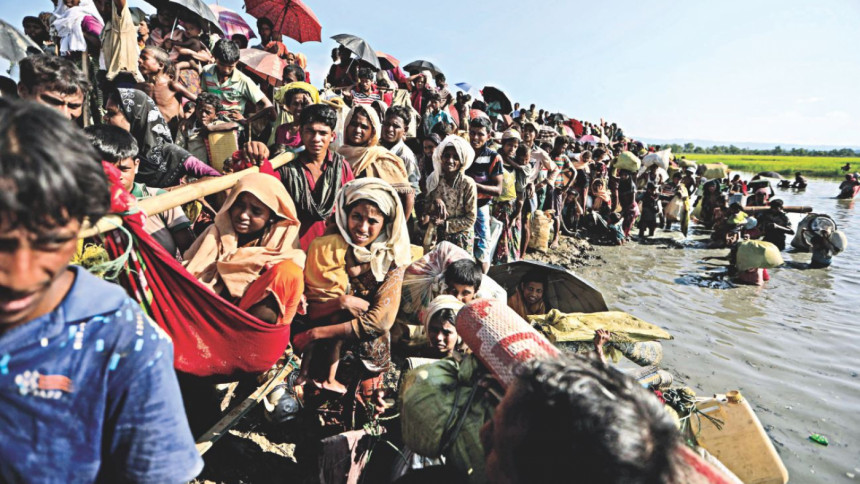Rohingya Crisis: EU doors closed for Myanmar generals

The European Union has said it will suspend invitations to Myanmar military commanders over the "disproportionate" use of force that has driven more than half a million Rohingyas out of the country.
The EU says the perpetrators of crimes against Myanmar's Rohingya minority must be brought to justice, and the 28-state bloc is reviewing defense cooperation over the violence.
"In the light of the disproportionate use of force carried out by the security forces, the EU and its Member States will suspend invitations to the Commander-in-chief of the Myanmar/Burma armed forces and other senior military officers and review all practical defence cooperation," according to the resolution adopted by the European Council in Luxembourg yesterday.
On September 18, Britain suspended financial aid and training to Myanmar armed forces amid "ongoing violence" in the country.
The EU foreign ministers at a meeting also said "credible allegations of serious human rights violations and abuses, including brutal attacks on children, must be thoroughly investigated".
The Council said it encourages Myanmar to enter into a dialogue with its neigbouring countries, in particular Bangladesh, on finding solutions to top common concerns, notably the repatriation of refugees to their place of origin.
The EU appreciated the constructive role played by Bangladesh under "difficult circumstances".
It also underlined the relevance of current EU restrictions on Myanmar that include an embargo on arms and equipment that could be used for internal repression.
The EU would consider additional measures if the situation in Rakhine did not improve, said the Council, adding that it also "stood ready to respond accordingly to positive developments".
"There are deeply worrying reports of continuing arson and violence against people and serious human rights violations, including indiscriminate firing of weapons, the presence of landmines and sexual and gender based violence," the foreign ministers said in a statement.
The Council in its resolution also called upon Myanmar to ensure the swift and full implementation of the recommendations of the Advisory Commission on Rakhine State, "especially the crucial issue of citizenship for the stateless Rohingya population".

The European foreign ministers also urged all sides to put an immediate end to violence and appealed to the Myanmar army to end its military offensive in Rakhine and ensure protection of all civilians without any discrimination.
It called upon the Myanmar government to calm tensions between communities and allow unconditional and safe humanitarian access to the region and ensure sustainable return of the Rohingyas who fled their homes and sought refuge in Bangladesh, as a result of violence and fear.
The Council also said the EU has stepped up humanitarian assistance for Rohingya refugees in Bangladesh and stands ready to extend its activities in Rakhine to help all people in need, if granted access.
END CRISIS IN RAKHINE: IPU
The Inter-Parliamentary Union (IPU) has expressed grave concerns about the continuing violence, intimidation and forced displacement of the Rohingyas from Myanmar's Rakhine State, reports BSS.
"Reports of documented widespread cruelty against Rohingya children, women and men and the ensuing massive exodus into neighbouring Bangladesh are very disconcerting," the IPU said in a joint statement by its President Saber Hossain Chowdhury and Secretary General Martin Chungong.
The IPU, a platform of national parliaments from around the world, condemned human rights violations and stressed the Myanmar authorities' responsibility to protect all people living in that country.
It asked Myanmar parliament, also an IPU member, to make every effort to help bring the crisis to an end.
Meanwhile, Bangladesh yesterday urged the IPU members to play an important role in mobilising world opinion to force Myanmar to resolve the Rohingya crisis, reports BSS.
Deputy Speaker Fazle Rabbi Miah made the call at the general discussion of the 137th IPU Assembly in Saint Petersburg, Russia, said a handout released in Dhaka, reports UNB.
Fazle Rabbi, leader of the Bangladesh parliamentary delegation to the assembly, explained his country's position on the Rohingyas.
Following a proposal placed by Bangladesh, the IPU Assembly held a general discussion on the humanitarian crisis and strengthening efforts to stop persecution of Rohingyas.
On Sunday, the deputy speaker placed a proposal before the IPU to include the Rohingya issue in its general discussion's agenda, which was adopted by vote.
Russian President Vladimir Putin opened the IPU assembly on Saturday as it drew around 2,000 parliamentary delegates from across the world for focus discussions on overcoming intolerance, xenophobia and extremism.


 For all latest news, follow The Daily Star's Google News channel.
For all latest news, follow The Daily Star's Google News channel. 







Comments